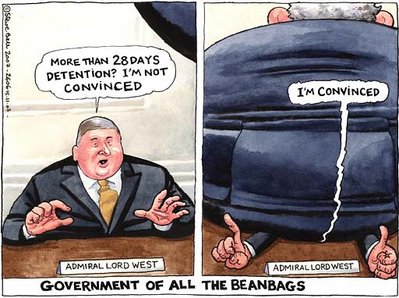The clunking fist's return to control freakery.
 David Miliband, in advance of making his first major speech on the European Union, lets his colleagues brief the media on what he's going to say. The Grauniad and Financial Times both run stories indicating that he was to suggest, along the lines of Nicolas Sarkozy's recent proposals, that the EU should expand its defence capabilities and also become a model global power. When Miliband makes the speech, the part about the defence was dropped entirely, and while the bit about being a model global power stayed in, he also said the following, via Nosemonkey:
David Miliband, in advance of making his first major speech on the European Union, lets his colleagues brief the media on what he's going to say. The Grauniad and Financial Times both run stories indicating that he was to suggest, along the lines of Nicolas Sarkozy's recent proposals, that the EU should expand its defence capabilities and also become a model global power. When Miliband makes the speech, the part about the defence was dropped entirely, and while the bit about being a model global power stayed in, he also said the following, via Nosemonkey:
“The EU is not and never will be a superpower. An EU of 27 nation states or more is never going to have the fleetness of foot or the fiscal base to dominate. In fact economically and demographically Europe will be less important in the world of 2050 that it was in the world of 1950.”
Hardly the optimistic, praising and strengthening speech that was set out in the briefings. So what happened? The Times ecstatically informs us (while the Scum has a similar article):
In a reminder of what happened all too often during the Blair years, Brown was terrified of the reaction of the Murdoch press. Already under fire for failing to supply the referendum they demand, journos on the Murdoch papers, as Martin Kettle writes, demanded an explanation for Miliband daring to go "off message":
The story about changes to the Bruges speech had emerged from Thursday's regular lobby briefing at Westminster, at which the Downing Street press secretary Michael Ellam had been quizzed by the Sun about that morning's previews of the Miliband speech in the Guardian. That doesn't mean Ellam was wise to say what he did to the lobby about the speech. Nor does it rule out the possibility of further private anti-European briefings to the Murdoch papers from No 10. Just because you're paranoid, it doesn't mean they're not out to get you.
Yesterday's Sun editorial certainly made clear what it thought of Miliband. Since disappeared, it argued that Miliband's proposal endangered Nato, which I might paraphrase slightly from memory, "had ensured 60 years of peace and seen off the Soviet Union." Both of those claims are highly arguable, with the EU and its predecessor organisations having just as much a hand in keeping the peace as Nato, and the Soviet Union collapsed in on itself, not through the actions of any other individual, but both the Scum and the Times had sent a message to Brown that the infantile Euroscepticism they both espouse was not to be endangered in any way by the actions of such an inexperienced whippersnapper as Miliband.
While Brown was never going to fully abandon the incestuous relationship his predecessor had with the Murdoch press, even though it helped towards his downfall, his attempts to woo his friend Paul Dacre instead suggested that no longer would the Sun be the house journal of Downing Street. As with much else, Brown appears to have had to row back, stung by his current weakness, into returning to his all too well-known control freak ways. First he told Alan West to change his mind immediately on extending the pre-charge detention limit, another topic close to the Sun's heart, which was enraged by how West might have undermined the whole policy by his failure to be certain in his defense of the Sun's pet project, then he humiliates Miliband by briefing against him and making him look like a fool by ordering changes to his most important address so far. The lack of change from the man who was so certain of how it was needed for the country of large has never been so apparent.
Labels: control freakery, David Miliband, European Union, Gordon Brown, Murdoch sycophancy
Post a Comment